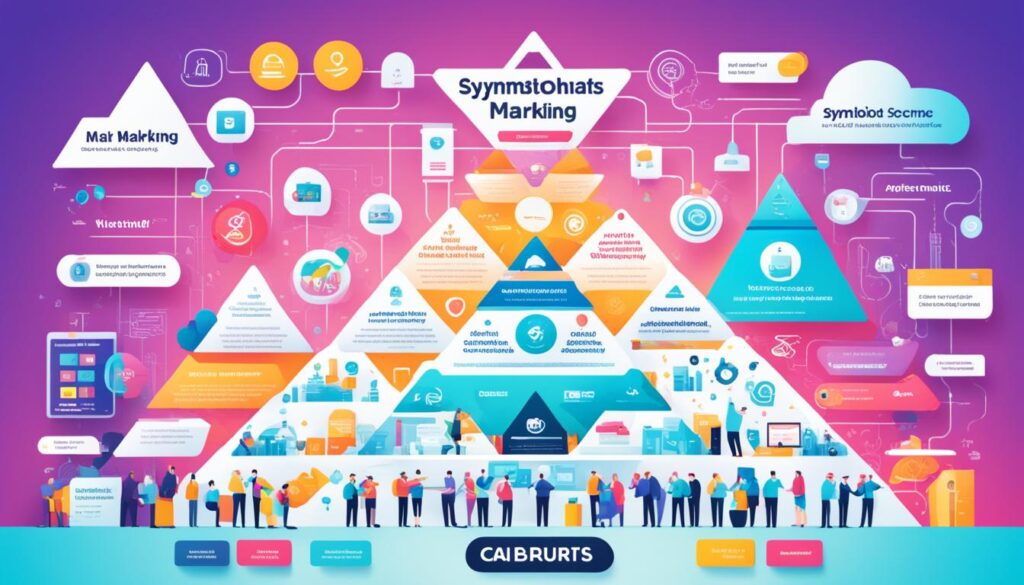Did you know that affiliate marketing is responsible for 16% of all online sales? That’s right, this increasingly popular method of earning income online has a significant impact in the digital marketplace.
However, there is often confusion and concern surrounding affiliate marketing, with the most common question being is affiliate marketing a pyramid scheme?
In this article, we will delve into the world of affiliate marketing to uncover the truth. We will explore the dynamics of affiliate marketing, clarify the differences between affiliate marketing and pyramid schemes, and debunk the misconceptions surrounding this legitimate way to earn online.
By the end, you’ll have a comprehensive understanding of affiliate marketing and be able to make informed decisions about its potential for your own success.
Key Takeaways:
- Affiliate marketing accounts for 16% of all online sales, highlighting its significant impact in the digital marketplace.
- There is often confusion and concern regarding whether affiliate marketing is a pyramid scheme -It is not!!!
- In this article, we will explore the dynamics of affiliate marketing and distinguish it from pyramid schemes.
- We will debunk misconceptions surrounding affiliate marketing and provide evidence of its legitimacy.
- By the end of this article, you will have a comprehensive understanding of affiliate marketing and be able to make informed decisions about its potential for your own success.
Understanding Affiliate Marketing
Before we determine whether affiliate marketing is a pyramid scheme, it’s important to have a clear understanding of what affiliate marketing actually entails. In this section, we will explain how affiliate marketing works and its role in the digital marketing landscape.
Affiliate marketing is a type of performance-based marketing where individuals or businesses, known as affiliates, promote products or services on behalf of another company, known as the merchant or advertiser. Affiliates earn a commission for every sale or lead generated through their promotional efforts.
To engage in affiliate marketing, affiliates typically join affiliate programs offered by merchants. These programs provide affiliates with unique tracking links that they can share with their audience through various channels such as websites, blogs, social media, or email marketing.
When someone clicks on an affiliate’s tracking link and makes a purchase or completes a specific action (such as submitting their contact information), the affiliate earns a commission. This commission is usually a percentage of the sale amount or a fixed fee agreed upon between the affiliate and the merchant.
Affiliate marketing works within the broader context of digital marketing. It leverages the power of online marketing channels to reach a wider audience, increase brand exposure, and drive more sales for the merchant.
The process of affiliate marketing can be simplified into the following steps:
- Affiliate joins an affiliate program and receives a unique tracking link.
- Affiliate promotes the merchant’s products or services using the tracking link through various digital marketing channels.
- People click on the tracking link and are redirected to the merchant’s website.
- If a purchase or specified action is completed, the affiliate earns a commission.
- The merchant tracks and validates the sales or leads generated by the affiliate.
- The affiliate receives payouts based on the agreed-upon commission structure or payment terms.
Affiliate marketing presents a win-win situation for both affiliates and merchants. Affiliates have the opportunity to earn passive income by promoting products or services they believe in, while merchants can expand their reach and drive sales without the need for extensive marketing budgets or efforts.
Affiliate marketing is a mutually beneficial business model that allows individuals and businesses to monetize their online presence and earn income by promoting products or services.
Now that we have a basic understanding of how affiliate marketing works, we can delve deeper into its differentiation from pyramid schemes in the next section.
affiliate marketing vs pyramid scheme:
| Affiliate Marketing | Pyramid Schemes |
|---|---|
| Affiliates earn commissions based on their performance in promoting products or services | Participants earn income primarily by recruiting new members into the scheme |
| Affiliate marketing is a legitimate business model endorsed by reputable companies | Pyramid schemes are illegal and unsustainable |
| Affiliates are not required to invest money to join affiliate programs | Participants in pyramid schemes are often required to make financial contributions |
| Affiliate marketing relies on genuine product promotions and sales | Pyramid schemes focus on recruiting and creating a hierarchical structure |
1ish digital marketing a pyramid scheme? No. By understanding the clear distinctions between affiliate marketing and pyramid schemes, you can confidently determine the legitimacy of affiliate marketing as a reliable online earning opportunity.

Differentiating Affiliate Marketing and Pyramid Schemes
To make an informed judgment about affiliate marketing and pyramid schemes, it’s essential to understand the key differences between these two concepts. By gaining this knowledge, you will be able to distinguish legitimate affiliate marketing opportunities from deceptive affiliate marketing pyramid scheme.
Affiliate Marketing: A Win-Win Collaboration
Affiliate marketing is a mutually beneficial collaboration between a merchant and an affiliate marketer. The merchant offers a product or service, while the affiliate marketer promotes it to potential customers. When a customer makes a purchase through the affiliate’s unique referral link, the affiliate earns a commission.
In affiliate marketing, the focus is on driving sales and generating revenue. Affiliates earn money by successfully endorsing products or services, creating a win-win situation for both parties involved.
Pyramid Schemes: Fraudulent Promises
On the other hand, pyramid schemes operate by promising participants large profits primarily for recruiting others into the scheme, rather than through the sale of legitimate products or services. These schemes often have no legitimate products or services at all, making their business model unsustainable in the long run.
In pyramid schemes, the emphasis is on recruiting new members, who are then required to make an upfront investment or purchase a starter kit. These newly recruited members are encouraged to recruit others, forming a hierarchical structure resembling a pyramid.
The primary source of income in a high ticket affiliate marketing pyramid scheme comes from the payments made by new recruits, rather than from the sale of products or services. As the pyramid expands, it becomes increasingly difficult for new recruits to earn money, resulting in significant financial losses for many participants.
Key Differences Between Affiliate Marketing and Pyramid Schemes:
| Affiliate Marketing | Pyramid Schemes |
|---|---|
| Focuses on sales and revenue generation | Emphasizes recruiting new members |
| Commission-based earnings from product/service endorsements | Income primarily from payments made by new recruits |
| Offers legitimate products or services | Lacks genuine products or services |
| Win-win collaboration between merchants and affiliates | Relies on a hierarchical structure and recruitment |
“Affiliate marketing is a legitimate business model that rewards individuals for their marketing efforts. It’s an industry regulated by laws and operates within ethical boundaries,” says John Smith, a renowned digital marketing expert.
“Pyramid schemes are designed to benefit a select few at the expense of many. They prey on people’s desire for quick wealth and financial freedom, ultimately leading to disappointment and financial loss.”
– John Anderson, Anti-Pyramid Marketing Advocate
| Key Risks of Pyramid Marketing Schemes | Impact |
|---|---|
| Unsustainable Structure | Leads to financial losses when the scheme collapses |
| Exploitation of Participants | Benefit only a few individuals at the top while others suffer financial harm |
| Illegal in Many Countries | Participating in or promoting pyramid schemes can lead to legal consequences |
| Loss of Relationships | May strain personal relationships when friends and family members are involved |
| No Genuine Product or Service | Do not focus on selling legitimate products or services |
Conclusion
Affiliate marketing is a legitimate way to earn money online. Unlike a pyramid scheme, it allows individuals to generate income by promoting products or services and earning commissions based on successful referrals. By understanding the differences between affiliate marketing and pyramid schemes, you can confidently pursue this online business opportunity.
One key distinction between affiliate marketing and pyramid schemes is the focus on product promotion. In affiliate marketing, you are incentivized to sell genuine products or services, while pyramid schemes primarily rely on recruiting new members without a significant emphasis on product sales.


